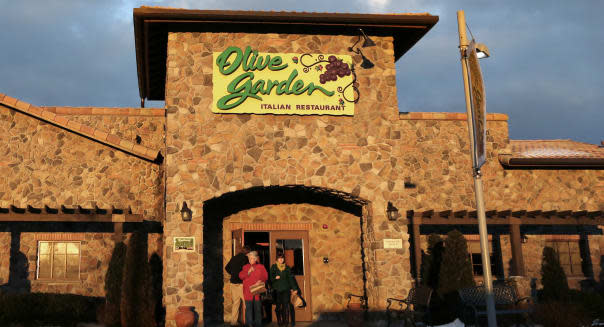Can Fancier Salads and New Pastas Save Olive Garden?

Change is coming to Olive Garden, and it is starting at the top of a bottomless salad bowl.
According to the Orlando Sentinel, the struggling chain has been emailing customers in its home turf of Central Florida to give them first dibs at trying upscale toppings on the salad bowls that accompany every meal. Options include Italian meats and cheeses and roasted tomatoes and capers.
The plan is simple: Olive Garden's been peddling essentially the same unlimited salads and breadsticks for decades and its menu could use a refresh. Sure, some people like them, but the equally iconic Cheddar Bay biscuit wasn't enough to save Olive Garden sibling Red Lobster, which parent Darden Restaurants (DRI) is looking to either spin off or sell after several uninspiring quarters.
Olive Garden also is testing greater pasta customization in the Orlando area, according to the Sentinel. With its new Cucina Mia options, guests can choose between several new shapes of pastas, sauces and meat toppings.
Darden Family Feud
Darden also owns LongHorn Steakhouse, Bahama Breeze, the Capital Grille, Seasons 52, Eddie V.'s and Yard House. All of those grew, sales-wise, at the individual restaurant level in Darden's latest quarter, but the same can't be said for the two flagship concepts that make up 70 percent of its business.
Same-restaurant sales declined 0.6 percent at Olive Garden and 4.5 percent at Red Lobster in Darden's most recent quarter. The quarter before that, Olive Garden checked in with a disappointing 4 percent decline in comps. That's especially disappointing because just a few months earlier Darden was forecasting flat to slightly positive same-restaurant sales growth.
One way or another, Darden will let Red Lobster go in a few months. It announced in December that it will try to unload the chain in a sale. If it can't smoke out a buyer, it will carve the seafood chain out from its empire of roughly 2,100 restaurants and distribute shares of Red Lobster as a standalone company. That's a white flag of surrender, and it also means that Olive Garden will carry a bigger load in shaping Darden's financials in the future.
Salad Days and Menu Missteps
Back in December, Darden announced that it would shave $100 million a year in capital expenditures by scaling back expansion. It will open new locations for its smaller concepts at a slower pace, and it's suspending new unit growth entirely at Olive Garden.
%VIRTUAL-article-sponsoredlinks%This is a clear threat to Olive Garden. Darden doesn't want to invest more money than it has to in the country's largest casual dining Italian chain until it turns things around. Given Darden's emphasis on saving money, it's a safe bet that Darden isn't planning a costly makeover to spruce up the restaurants to make them more modern or inviting.
If Olive Garden sticks around, it's going to have to win back customers with menu changes, such as last year's Italiano Burger (just as a year earlier, we saw Red Lobster beef up its non-seafood offerings). Don't be surprised if you see Olive Garden tweaking its menu more often this year. Letting Red Lobster go is a public admission that Darden isn't going to put up with a chain -- no matter how big it is -- if it's starting to fade in popularity.
Motley Fool contributor Rick Munarriz has no position in any stocks mentioned. The Motley Fool has no position in any of the stocks mentioned. Try any of our newsletter services free for 30 days.

